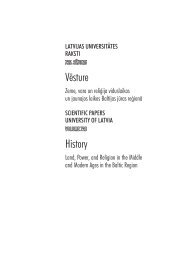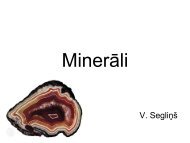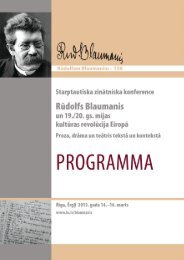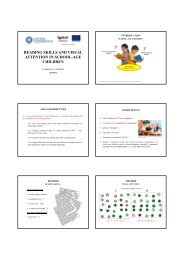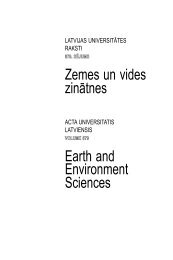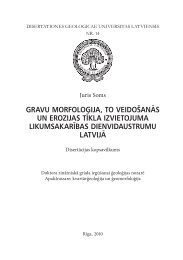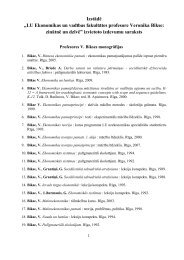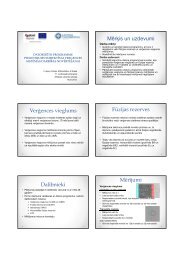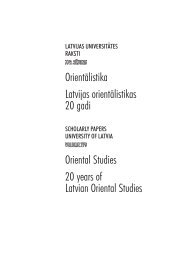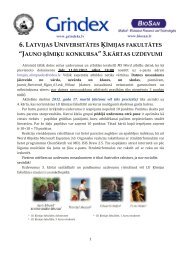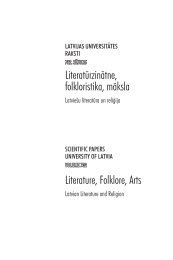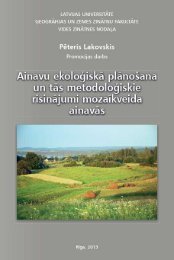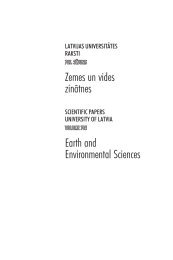Latgalistikys kongresu materiali, III. 2011. - Latvijas Universitāte
Latgalistikys kongresu materiali, III. 2011. - Latvijas Universitāte
Latgalistikys kongresu materiali, III. 2011. - Latvijas Universitāte
Create successful ePaper yourself
Turn your PDF publications into a flip-book with our unique Google optimized e-Paper software.
In the texts where the author evokes his wife and his daughter,<br />
tenderness, but also a great optimism, are felt everywhere; he is not<br />
doubtful of the fact that he will find again that momentarily lost happiness.<br />
One might also wonder here if it not a matter of some kind of autosuggestion.<br />
Once again, if the author recalls his family, he does it only in<br />
the context of their living place, the town of Châtelet which he loved<br />
above all.<br />
Soye, soye, Marîye qui soye, / Su l’ trotwêr d’èmon Roscây, / Dji ratind<br />
qu’èle s’èn-n-èvâye / Du coûrs dèl Crwès Roudje...<br />
‘Saw, saw, sawing Mary, / On the pavement of the café Roscaille, / I ’m<br />
waiting for her to get out of the Red Cross class...’ (“Plouve” ‘Rain’, p. 56)<br />
A revealing detail found in the poem “Ô bôrd du Rhône” ‘By the<br />
Rhone’ is the following one: in the main body of that poem, the author<br />
does not mention the name of the French river, but he uses the name of the<br />
watercourse which bathes his town, namely the Sambre river; this is a<br />
form of reappropriation of his living place.<br />
Vo man, avou s’ tchapia as-éles, / Pôjêre come li batia qui duveut ridér /<br />
Su Sambe, pa d’rî zèles, a lèyi montér / Dissus sès lèpes, dins sès-oûys, tout<br />
li / Lôme qui suke si keûr môgré lès-angouches / Èt lès zines.<br />
‘Your mother, with her straw hat, / Quiet like the boat that must have<br />
been gliding / Over the Sambre, behind them, has let go up / On her lips,<br />
into her eyes, all the / Honey that sweetens her heart in spite of her<br />
anxieties / And her hare-brained ideas.’<br />
(“Ô bôrd du Rhône” ‘By the Rhone’, p. 82)<br />
As we already said above, there is no trace in those texts of hostile<br />
feelings, of hatred which some would suppose to find there; there are no<br />
portraits of grotesque jailers, but there is of course an underlying<br />
questioning about the uselessness of the suffering caused by war. Besides,<br />
a short poem “Droci” ‘Here’ sums up the whole anthology and is worth<br />
being used here as a conclusion.<br />
Nos-ârons apris, / Branmint, toudis, / A r’trouvér sins mô, sins rûjes / Çu<br />
qu’i-gn-a d’ pus simpe, / Çu qu’i-gn-a d’ mèyeû, / Li pirète di l’ome / Mins<br />
çu qu’i-gn-a d’ pus pîre ètou: Lès broûs.<br />
‘We will have learned, / Much, / To find again easily / The simplest, /<br />
And the best, / In us / The basest also: / Mud.’ (“Droci” ‘Here’, p. 52)<br />
Source<br />
Émile Lempereur. Greifswald — Powènes di prijonîs / illustrations d’Angela Mahler.<br />
Charleroi: “èl bourdon”, 2010.<br />
39



